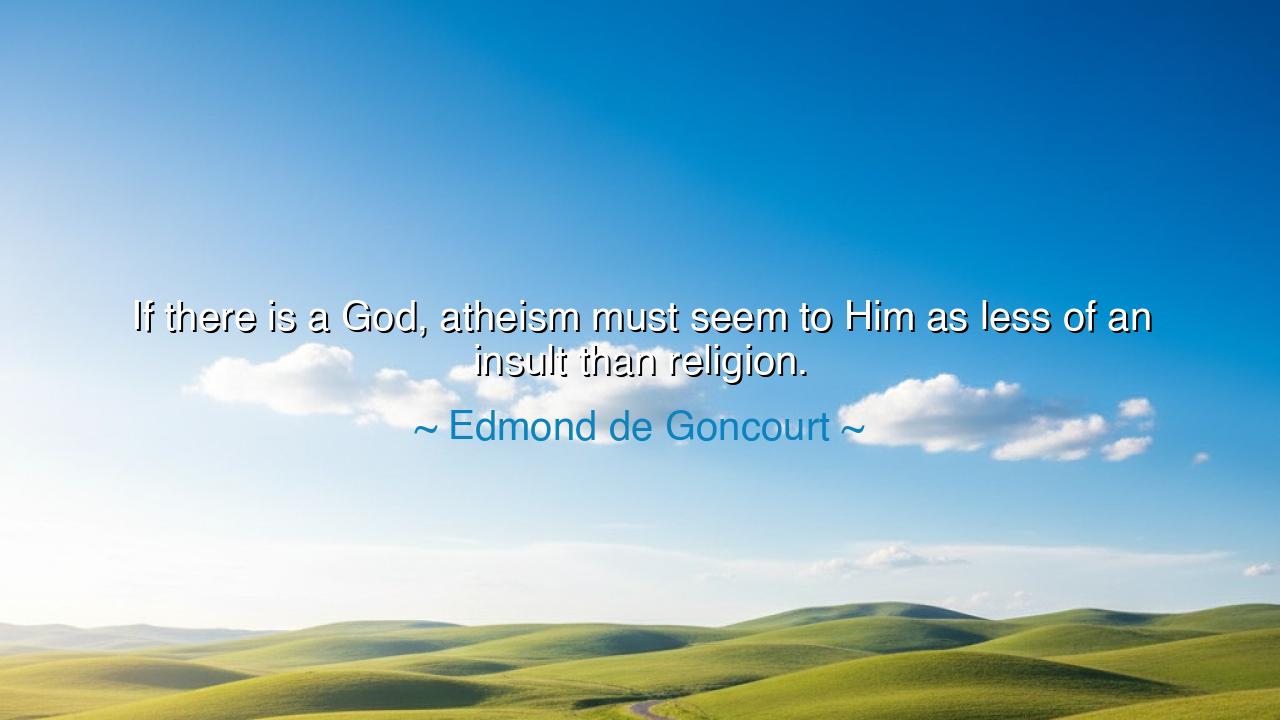
If there is a God, atheism must seem to Him as less of an insult






In the quiet recesses of the human spirit, there lies a profound question that has echoed through the ages: what does the divine truly think of our beliefs and actions? Edmond de Goncourt, in his sharp reflection on the nature of faith, offers a striking perspective: "If there is a God, atheism must seem to Him as less of an insult than religion." This provocative statement invites us to consider the nature of faith itself—not as an act of devotion, but as a reflection of human nature and its complex relationship with the divine.
At first glance, Goncourt’s words might seem to challenge the very foundation of religious belief. He suggests that atheism, or the denial of God, might be viewed as less offensive to the divine than the religious act itself. But upon deeper reflection, we begin to see that Goncourt is not attacking the spiritual quest; he is pointing out a profound irony in how religion is practiced. Religion, with its rituals, institutions, and doctrines, often attempts to limit or define the divine, to box the infinite into human concepts. It seeks to channel God's power and will into a form that is palatable and understandable, reducing the vast and ineffable divinity to a set of prescribed behaviors, beliefs, and rituals.
Consider the ancient Greek pantheon, where gods and goddesses were worshipped with the expectation of appeasing them through offerings, sacrifices, and rites. The gods were often depicted in human-like forms, with emotions, desires, and flaws. In many ways, these gods were bound by human conceptions of justice, love, and wrath. While such depictions offered people a way to relate to the divine, they also limited the potential of God to something that fit within the realm of human understanding. Goncourt’s words can be seen as a critique of this tendency to reduce the divine to a mere extension of human qualities, to try to mold it into an image that serves human needs and fears, rather than allowing God to be as vast, as unknowable, and as free as the cosmos itself.
In contrast, atheism, in its simplest form, does not attempt to define or limit the divine. It questions the existence of God, not in opposition to the divine, but in recognition of the uncertainty and mystery that surrounds the ultimate questions of existence. The atheist, in denying the divine, may be seen as offering honesty, a refusal to create a false image or to reduce the infinite into something manageable. Goncourt suggests that this honest, though skeptical, position might seem less of an insult to God than the rituals, prayers, and religious systems that often misrepresent or restrict the divine essence.
Throughout history, we see many examples of how organized religion has sometimes served to oppress rather than elevate the human spirit. Consider the story of Galileo Galilei, whose scientific discoveries about the nature of the universe directly contradicted the religious teachings of his time. The Catholic Church, in its claim to absolute authority over the truth, condemned Galileo’s findings, forcing him to recant or face the consequences of heresy. In this case, the institutionalized religion not only stifled the growth of knowledge but also sought to control the way people thought about the world, thus reducing the divine to a series of dogmas that could be used to maintain power and influence. Galileo’s struggle highlights how religion, when it becomes rigid and authoritarian, can distort the very essence of truth and freedom, which might be closer to the heart of the divine.
In contrast, the atheist position, which denies the existence of God, might seem to have more room for honesty in its rejection of the divine. It does not reduce God to a set of rituals or dogmas; it leaves the divine as an open question, unshackled by the constraints of human-made institutions. This, in Goncourt’s view, could be seen as less of an offense to God than a religion that seeks to encapsulate the infinite into a finite framework. Atheism, then, is not necessarily an attack on the divine, but a recognition of human limitations in understanding something beyond comprehension.
The lesson in Goncourt’s words is one of humility and recognition of the mystery of existence. Whether we choose to embrace a faith, question that faith, or reject it entirely, we must remember that the divine, if it exists, is beyond our understanding and cannot be contained in the small boxes of our beliefs. Religion, when it seeks to define the divine in rigid terms, risks missing the greater truth—that the divine, whatever it may be, is beyond human comprehension. We are called not to create God in our image but to approach the divine with humility, wonder, and an understanding of our own limitations.
Therefore, let us be cautious in how we approach the divine, knowing that honesty and humility are the keys to understanding life’s mysteries. Whether through faith or skepticism, we must avoid reducing the divine to a system that serves only our own human needs. Instead, let us embrace the unknown, the uncertain, and the vastness of the universe with an open heart and a mind free from dogma. In this way, we may approach the divine not as something to be controlled or understood, but as something to be respected and wondered at, knowing that it transcends all that we can comprehend.






AAdministratorAdministrator
Welcome, honored guests. Please leave a comment, we will respond soon